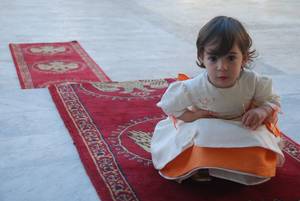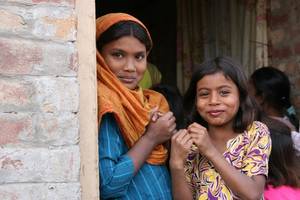Lucy's Reflection
I love the Bell Bajao! ads from the Indian campaign against domestic violence. They urge people, particularly men, to make a stand against domestic violence wherever they witness it. So we see lads playing cricket in the street pretend that they have lost their ball so that they have an excuse to ring the bell of a flat where a man is beating his wife. We see a famous Indian film star pretend he needs to borrow a phone so he can interrupt another violent assault. When his mobile rings in his pocket, making a mockery of his interruption, he risks making a fool of himself.
It interests me that the ads encourage people to think of excuses, however ridiculous, to get involved. Why do we need a flimsy excuse to challenge something which is patently wrong? Are there times when this is what stops us speaking out? When we can’t think of a good excuse? I admire the Bell Bajao ads because they are honest about the conspiracy of silence which surrounds violence in our cultures. How often have I walked past a mother violently releasing all her pent up emotions on a small child for touching the wrong thing in the supermarket? How often have I found it easier to accept a workmate’s implausible story about her black eye? I don’t want to make things worse. I don’t want to call their anger onto me. I don’t want to make things worse so I don’t get involved.
When we get involved, we risk making a fool of ourselves. We risk doing the wrong thing. We risk the anger and violence being directed towards us. But we also risk NOT being an instrument of compassion, NOT being a bridge to healing or a fresh start. If those who suffer hold in themselves the image of Christ, then it is Christ we are leaving in torment. If we are Christ’s body on earth, then by turning a blind eye, we are denying people his healing touch.
I currently live in Switzerland, a land famous for its humanitarianism and neutrality. And in recent months the Swiss media has been dominated by two cases in which a legal stand against violence has become the subject of much debate and repercussion. This is not the place to lay out the backgrounds to the arrest of Hannibal Khadaffi by the Geneva Police, or the house arrest of Roman Polanski – you can google the stories and find thousands of opinions. My point is that making a stand against violence is not without controversy and even the best intentions can get messy. But as we draw into Holy Week and prepare to hear the gospel stories of chaos and mess, baying crowds and leaders who don’t want to get involved, we are reminded that our God has entered the messiness and violence of human life and transformed it, through the Cross and the Resurrection. Our God did get involved, Jesus did ‘make a fool of himself’ and miraculously the world is transformed and redeemed.
These adverts urge us to face up to the realities of violence in all societies. By depicting film stars and pastors, children and ordinary folk, they are inciting us to open our eyes to the reality of violence. It’s Not Okay, the ad from Aotearoa New Zealand, is brilliant at depicting the continuum of violence. It is uncomfortable to watch because few among us will not have behaved in some of the ways described. I love the ending – ‘But it is okay to ask for help’. As this study series draws to a close, I pray that each of us will find the courage to get involved. Maybe we will make fools of ourselves sometimes; maybe we will make mistakes; maybe we will never know the effect of our action on others. But we can know, for sure and certain, because of Easter, that God loves each of us dearly, and longs for us to work together for justice and peace. May this God sustain and comfort us, today and every day.
About the Author
Lucy D’Aeth is an English born New Zealander who has been living in Switzerland for two years. Most of her time at present is taken up being mother to three young children (11,9 and 5), but in previous lives she has studied history and theology and has worked for churches and in Public Health. She is active in her local Lutheran Church and is daily challenged and enriched by living in such a multicultural community.
Natalie's Reflection
Home Sweet Home?
Home should be a safe space but is too often a dangerous place, especially for women. Each of this week's films tackles issues around violence against women by intimate partners. They are compelling to watch and deeply disturbing. "It's not OK" brings different men and women speaking of the spectrum of violence that takes place in what is supposed to be everyone's private sanctuary - the home. The two other films accompany women on their commutes home and what is encountered when each arrives there. The brutality depicted in the first film is deeply disturbing while the other leaves the viewer in nervous suspense of what may be in store.
The film with a young woman alone in a train and walking through a deserted subway station plays on a juxtaposition. We imagine the woman on the subway may be in danger. But we think the threat comes from being a woman alone in a train or in the subway station after dark. The film depicts this potentially dangerous place is actually safe compared to what she is risking at home. It demonstrates her lack of security and vulnerability both in the public and private spheres. How can she engage fully in her community, her society, when she is surrounded by violence both real and threatened? We are too complacent of violence and need to challenge this in our communities, churches and organisations. We are too accepting that women should not travel alone at night on public transport like a subway. So many women are confronted by this daily violence and abuse in our communities. With 70% of women experiencing physical or sexual violence from men in their lifetime - at home, at work, on the streets, during peacetime and in conflict, it harms all of us. Violence against women is a grave violation of human rights and of human dignity. We need to say stop and come together for a world where women and girls are safe.
About the Author
Natalie Fisher-Spalton is the Deputy General Secretary of the World Young Women's Christian Association (World YWCA) in Geneva, Switzerland. She comes from a small town in eastern Canada and has worked on women's rights including around violence against women and HIV and AIDS for over 15 years. She has studied international and community development and lived in Thailand and Cambodia. Natalie is married and has two young sons, ages 8 and 5. The World YWCA aims to be a safe space and is a global network of women leading social and economic change with an outreach of 25 million women and girls in over 120 countries worldwide. It advocates for peace, justice, health, human dignity, freedom and care of the environment, and has been at the forefront of raising the status of women since it was founded in 1855.





